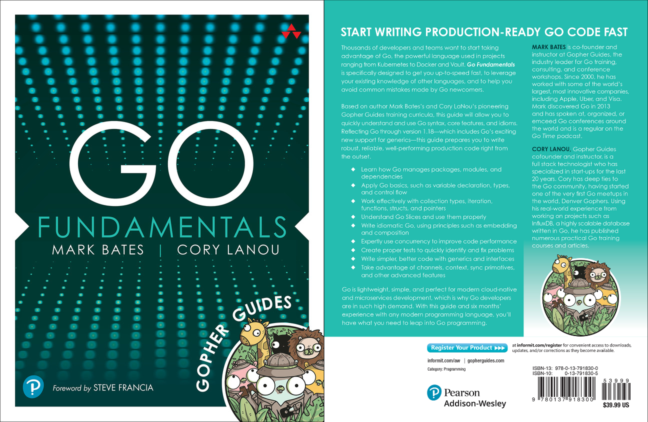Go Fundamentals - Sample
Table of Contents
Chapter 12.9: Context Errors
In a complex system, or even in a small one, when a context.Context is cancelled, we need a way to know what caused the cancellation. It is possible that context.Context was cancelled by a context.CancelFunc successfully, if it was cancelled because it timed out, or some other reason.
The context.Context.Err method, Listing 12.1 returns the error that caused the context to be cancelled.
$ go doc context.Context.Err
package context // import "context"
type Context interface {
// If Done is not yet closed, Err returns nil.
// If Done is closed, Err returns a non-nil error explaining why:
// DeadlineExceeded if the context's deadline passed,
// or Canceled if the context was canceled for some other reason.
// After Err returns a non-nil error, successive calls to Err return the same error.
Err() error
}
--------------------------------------------------------------------------------
Go Version: go1.24.4
context.Context.Err method.Context Cancelled Error
The context package defines two different error variables that can be used to check an error that was returned from context.Context.Err method.
The first is context.Canceled, Listing 12.2, which is returned when the context is cancelled through the use of a context.CancelFunc function. This error is considered to indicate a "successful" cancellation.
$ go doc context.Canceled
package context // import "context"
var Canceled = errors.New("context canceled")
Canceled is the error returned by [Context.Err] when the context is canceled
for some reason other than its deadline passing.
--------------------------------------------------------------------------------
Go Version: go1.24.4
context.Canceled error.Consider Listing 12.3. When we first check the context.Context.Err method, it returns nil. After we call the context.CancelFunc function provided by context.WithCancel, the context.Context.Err method returns a context.Canceled error.
func main() {
// create a background context
ctx := context.Background()
// wrap the context with a
// cancellable context
ctx, cancel := context.WithCancel(ctx)
// check the error:
//
fmt.Println("ctx.Err()", ctx.Err())
// cancel the context
cancel()
// check the error:
// context.Canceled
fmt.Println("ctx.Err()", ctx.Err())
// check the error again:
// context.Canceled
fmt.Println("ctx.Err()", ctx.Err())
} $ go run .
ctx.Err() <nil>
ctx.Err() context canceled
ctx.Err() context canceled
--------------------------------------------------------------------------------
Go Version: go1.24.4
As we can see from the output in Listing 12.3, repeated calls to the context.Context.Err method return the same context.Canceled error.
Context Deadline Exceeded Error
When a context.Context is cancelled due to a deadline, or timeout, being exceeded, the context.Context.Err method returns a context.DeadlineExceeded error, Listing 12.4.
$ go doc context.DeadlineExceeded
package context // import "context"
var DeadlineExceeded error = deadlineExceededError{}
DeadlineExceeded is the error returned by [Context.Err] when the context is
canceled due to its deadline passing.
--------------------------------------------------------------------------------
Go Version: go1.24.4
context.DeadlineExceeded error.Consider Listing 12.5. We create a context.Context that will self cancel after 1 second. When we check context.Context.Err method, before the context.Context times out, it returns nil.
func main() {
// create a background context
ctx := context.Background()
// wrap the context that will
// self cancel after 10 milliseconds
ctx, cancel := context.WithTimeout(ctx, 10*time.Millisecond)
defer cancel()
// check the error:
//
fmt.Println("ctx.Err()", ctx.Err())
// wait for the context to self cancel
<-ctx.Done()
// check the error:
// context.Canceled
fmt.Println("ctx.Err()", ctx.Err())
// check the error again:
// context.DeadlineExceeded
fmt.Println("ctx.Err()", ctx.Err())
} $ go run .
ctx.Err() <nil>
ctx.Err() context deadline exceeded
ctx.Err() context deadline exceeded
--------------------------------------------------------------------------------
Go Version: go1.24.4
As we can see from the output, the context.Context times out after the specified time, and the context.Context.Err method returns a context.DeadlineExceeded error.

